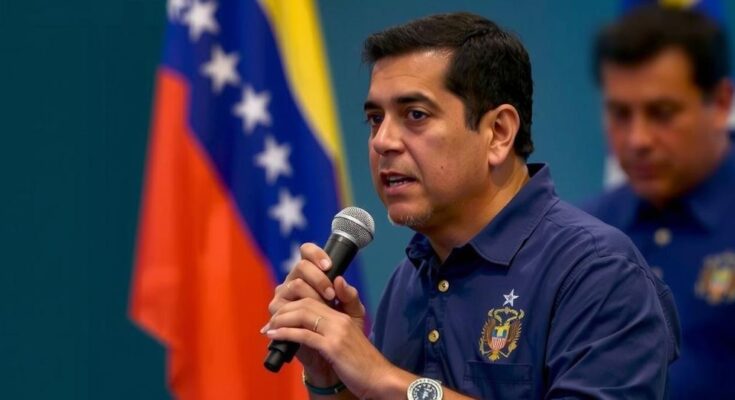The U.S. recognized Edmundo González as Venezuela’s president-elect, following a disputed election that saw President Nicolás Maduro claiming victory. Blinken emphasized the importance of acknowledging the voters’ will, while the opposition claimed González won by a significant margin. Maduro’s government has faced criticism over transparency and credibility in the electoral process amidst rising international skepticism, particularly from neighboring countries.
On Tuesday, the U.S. government officially recognized Edmundo González, a Venezuelan opposition candidate, as the president-elect of Venezuela, months after President Nicolás Maduro had declared victory in the contested July election. U.S. Secretary of State Antony Blinken made the announcement via a post on X, underscoring the need for respect regarding the will of Venezuelan voters. While the Biden administration asserted that González obtained the most votes in the disputed election held on July 28, it had previously refrained from formally acknowledging him as president-elect. Following the election, Venezuela’s National Electoral Council—dominated by Maduro supporters—quickly announced Maduro’s re-election, while votes were not detailed as they had been in prior elections. In contrast, the opposition coalition collected and publicly shared results from about 80% of electronic voting machines, suggesting that González garnered approximately twice the votes of Maduro. González expressed gratitude for the recognition of Venezuelans’ sovereign will, framing it as an acknowledgment of their collective desire for change. However, González had to seek asylum in Spain in September after facing an arrest warrant tied to an investigation surrounding the vote count publication. In response to Blinken’s comments, Venezuelan Foreign Minister Yván Gil dismissed the recognition, opting for personal attacks against Blinken rather than addressing the electoral allegations. Maduro, alongside electoral officials, has consistently rejected requests from various nations for transparency in the electoral process, including calls for detailed vote tallies. In light of the controversies, Maduro requested an audit from Venezuela’s Supreme Tribunal of Justice, which subsequently reaffirmed his election victory. United Nations and Carter Center experts critiqued the credibility of the announced results, although they did not directly validate the opposition claims but indicated that the opposition’s vote tallies included original security features. Meanwhile, Colombian President Gustavo Petro revised his previous support for the elections, deeming them a mistake, which illustrates growing international skepticism regarding the electoral legitimacy in Venezuela. As the next presidential term is poised to begin on January 10, Maduro has already been invited to a swearing-in ceremony by the National Assembly, which is under his party’s control.
The political landscape in Venezuela has been characterized by significant tension and division, particularly following the controversial elections held in July. Maduro’s administration faces accusations regarding electoral misconduct and lack of transparency, raising questions about the legitimacy of his rule. The opposition has claimed major electoral fraud, which has led to international scrutiny and calls for reform. Various nations, including the United States and members of the European Union, have expressed their discontent with the electoral process, signaling broader geopolitical implications. With the acknowledgment of Edmundo González as the president-elect by the U.S., the situation underscores a critical moment in Venezuelan politics as the democratic process and national governance continue to be contested.
The U.S. government’s recognition of Edmundo González as the president-elect of Venezuela highlights the ongoing struggle for democratic integrity in a nation beset by allegations of electoral fraud. As Maduro’s administration maintains control amid international skepticism, the contrasting perspectives from the Venezuelan opposition and foreign governments underscore the complexity of the political situation. With the new presidential term approaching, the unresolved questions surrounding the legitimacy of the recent elections continue to cast a shadow over Venezuela’s political future.
Original Source: apnews.com




